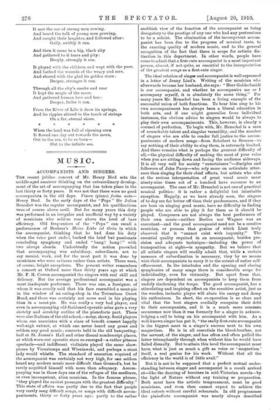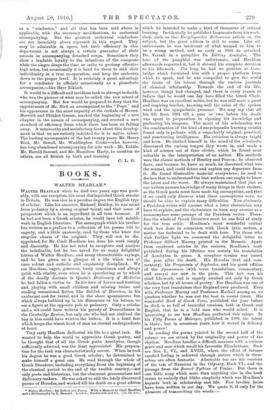M U S IC.
ACCOMPANISTS AND SINGERS.
Tus recent jubilee concert of Mr. Henry Bird sets the middle-aged amateur thinking on the extraordinary develop-, ment of the art of accompanying that has taken place in the last thirty or forty years. It was not that there were no good accompanists in the old days. Vixere (piano) fortes ante— Henry Bird. In the early days of the "Pops " Sir Julius Benedict was the regular accompanist, and his qualifications were of course above cavil. But for many years this duty was performed in an irregular and unofficial way by a variety of musicians who seldom rose above the level of bare efficiency. Old frequenters of the " Pops " can recall a performance of Brahms's lifeine Liebe ist Gran in which the accompanist, thinking that he had done his duty when the voice part ended, burked the brief but passionate concluding symphony and ended " bang ! bang !" with two abrupt chords. Undoubtedly the notion prevailed that accompanying was subsidiary, subordinate, not to say menial, work, and for the most part it was done by musicians who were artisans rather than artists. There were, of course, bright exceptions. The present writer remembers a concert at Oxford more than thirty years ago at which Mr. F. H. Cowen accompanied the singers with real skill and delicacy. But the average professional accompanist was a most inadequate performer. There was one, a foreigner, of whom it was cruelly said that his face resembled a meat-pie in the window of an eating-shop in the Tottenham Court Road, and there was certainly not more soul in his playing than in a meat-pie. He was really a very bad player, and even in accompanying old-fashioned operatic arias gave a very sketchy and scratchy outline of the pianoforte part. There were also Italians of the old school,—noisy, showy, florid players whom one associates with a class of benefit concert happily well-nigh extinct, at which one never heard any great and seldom any good music; concerts held in the old banqueting- hall at St. James's Hall and other dismal nondescript places, at which worn-out operatic stars re-emerged—a rather piteous spectacle—and indifferent violinists played the same show- pieces by Vieuxtemps and Wieniawski, and perhaps a stout lady would whistle. The standard of execution required of the accompanist was certainly not very high, for one seldom heard any modern music more difficult than Gounod's, but he rarely acquitted himself with more than adequacy. Accom- panying was in those days one of the refuges of the mediocre, or even incompetent, alien musician. In the famous phrase, "they played the easiest passages with the greatest difficulty." This state of affairs was partly due to the fact that people very rarely sang difficult songs, or songs with difficult accom- paniments, thirty or forty years ago ; partly to the rather
snobbish view of the function of the accompanist as being derogatory to the prestige of any one who had any pretensions to be a soloist. The elimination of the incompetent accom- panist has been due to the progress of musical taste, to the exacting quality of modern music, and to the general recognition of the fact that there is scope for artistic dis- tinction in this department. In other words, people have come to admit that a first-rate accompanist is a most important person, almost, if not quite, as essential to the interpretation of the greatest songs as a first-rate singer.
The ideal relation of singer and accompanist is well expressed in a letter of Jenny Lind's. Writing of the musician who afterwards became her husband, she says : "Herr Goldschrnidt is our accompanist, and whether he accompanies me or I accompany myself, it is absolutely the same thing." Foi many years Mr. Henschel has been a living example of the successful union of both functions. To hear him sing to his own accompaniment has always been a liberal education in both arts, and if one might generalise from individual instances, the obvious advice to singers would be always to play their own accompaniments. This, however, is clearly a counsel of perfection. To begin with, Mr. Henschel is a man of remarkable talent and singular versatility, and the number of singers who are able to render full justice to the accom- paniments of modern songs—from Schubert to Strauss—to say nothing of their ability to sing them, is extremely limited. And there remains what is perhaps the greatest difficulty of all,—the physical difficulty of making the most of your voice when you are sitting down and facing the audience sideways. It is all very well for society " entertainers "—disciples and followers of John Parry—who rely more on articulate utter- ance than singing for their chief effects, but artists who aim at the serious interpretation of great vocal music must ninety-nine times out of a hundred have recourse to an accompanist. The case of Mr. Henschel is not one of practical musical politics : it is rather a delightful but inimitable exception. Happily, as we have already seen, the singers of to-day are far better off than their predecessors, and if they are bent on singing good music, have no difficulty in finding people who are able to play it for them as it should be played. Composers are not always the best performers of their own music—neither Berlioz nor Wagner was an executant—and the good accompanist need not be a creative musician, or possess that genius of which Liszt truly observed that it "cannot exist with impunity." The essential quality required in an accompanist, besides pre- cision and adequate technique—including the power of transposition at sight—is sympathy. But we believe that all artistic singers will readily admit that, while a certain measure of subordination is necessary, they by no means wish their accompanists to carry it to the extent of entire self- effacement. In the interludes and the opening and closing symphonies of many songs there is considerable scope for individuality, even for virtuosity. But apart from that, singers are dependent on accompanists to keep them from unduly slackening the tempo. The good accompanist, has a stimulating and inspiring effect on the sensitive artist, just as the wooden, inelastic player will abate his energy and damp his enthusiasm. In short, the co-operation is so close and vital that the best singers cordially recognise their debt to their accompanists, and it is a much more common occurrence now than it was formerly for a singer in acknow- ledging a call to bring on his accompanist with him. As a well-known singer has put it, " the really first-rate accompanigt is the biggest asset in a singer's success next to his own magnetism. He is in all essentials the blood-brother, not the servant, of the singer, and has often and often pulled the latter triumphantly through when without him he would have failed dismally. But to attain this level the accompanist must have, what is just as much a gift as voice or magnetism' itself, a real genius for his work. Without that all the
efficiency in the world is of little avail." • But it is not to be supposed that a perfect mutual under-
standing between singer and accompanist is a result arrived at—like the dancing of heroines in mid-Victorian novels—by the light of Nature without any training or preparation. Both must have the artistic temperament, must be good musicians, and even then cannot expect to achieve the ideal. entente without careful rehearsals. In old programmes the pian. ofo rte accompanist was nearly always described
as a " conductor," and all that has been said above is applicable, with the necessary modifications, to orchestral accompanying. But the greatest orchestral conductors are not invariably above reproach in this regard. They may be admirable in opera, but their efficiency in this department is not always a certain guarantee of their success in accompanying detached songs. Sometimes they show a laudable loyalty to the intentions of the composer when the singer drags the time or seeks to prolong effective high notes, but occasionally it is hard for them to sink their individuality in a true co-operation, and keep the orchestra down to the proper level. It is certainly a great advantage for a conductor to officiate occasionally as a pianoforte accompanist,—like Herr Nikisch.
It would be a difficult and invidious task to attempt to decide who was the pioneer of what may be called the new school of accompanying. But few would be prepared to deny that the appointment of Mr. Bird as accompanist to the " Pops," and his appearance in the same capacity at the recitals of Messrs. Borwick and Plunket Greene, marked the beginning of a new chapter in the annals of accompanying, and erected a new standard of efficiency from which there has been no falling away. A noteworthy and satisfactory fact about this develop- ment is that we are entirely indebted for it to native talent. The leading accompanists of the last twenty years, Mr. Henry Bird, Mr. Sewell, Mr. Waddington Cooke—who, however, has long abandoned accompanying for solo work—Mr. Liddle, Mr. Harold Samuel, and Mr. Hamilton Harty, to mention no others, are all British by birth and training.
C. L. G.







































 Previous page
Previous page